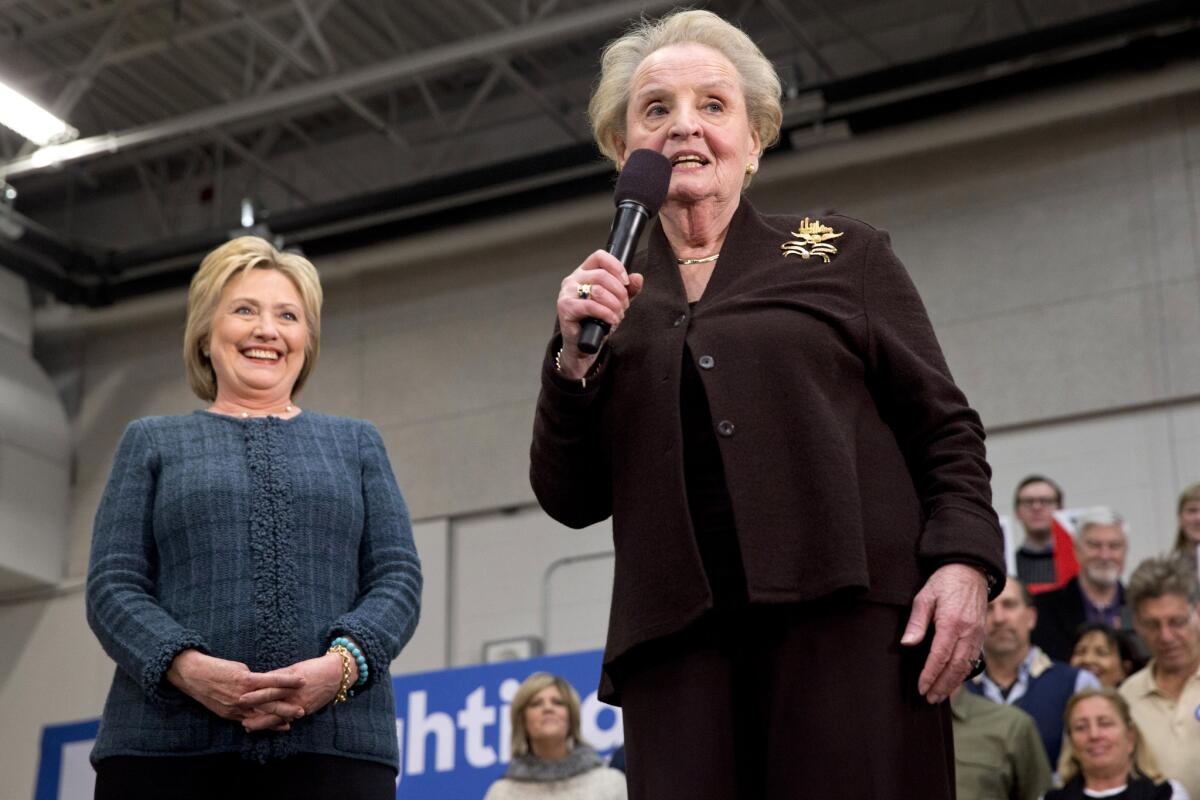Feminists, find a better reason to vote for Hillary Clinton

Former Secretary of State Madeleine Albright introduces Democratic presidential candidate Hillary Clinton at a campaign event in Concord, N.H. on Feb. 6.
- Share via
Ever since they cast their very first ballots for a U.S. president, voters in this country have entrusted the White House only to candidates with a Y chromosome. In fact, the major parties haven’t even nominated a woman for president, and only two for vice president: former Rep. Geraldine Ferraro, whom Democrats sent off alongside Walter Mondale to be crushed by incumbent President Ronald Reagan in 1984, and former Alaska Gov. Sarah Palin, whom Republicans selected in the vain hope of lifting John McCain over Barack Obama.
It will be a red-letter day when women finally break this glass ceiling, one of the last in American politics, just as it was when women were finally entrusted to lead Fortune 500 companies, decide Supreme Court cases and run state governments. And 2016 might be the year the ceiling shatters, given that Hillary Clinton is the Democratic Party’s front-runner. But the tightening race between Clinton and Vermont’s socialist senator Bernie Sanders has led some notable voices in the party to squabble over whether women should vote for Clinton just for the sake of ending the male monopoly in the Oval Office. And no, they should not.
Democrats shouldn’t leap into Clinton’s column just for the history-making precedent or the symbolism. Her candidacy needs no such help.
New Hampshire is holding the nation’s first presidential primary today, and recent polls show Sanders with a large and solidifying lead. As was the case in last week’s Iowa’s caucuses, however, there are pronounced gender and age gaps between the two rivals: Hillary is doing better with women and older voters, Sanders with men and younger ones.
But the age gap can be found even among voters who describe themselves as feminists, as columnist Meghan Daum noted recently. Some younger feminists fault Clinton for not being the liberal champion they seek on such issues as poverty and social inequality. That’s led a handful of prominent older feminists to say, in effect, that women have a duty to vote for Clinton because she’s one of them and Sanders isn’t. As former Secretary of State Madeleine Albright put it while stumping for Clinton: “There’s a special place in hell for women who don’t help each other.”
Would Albright say the same thing on Carly Fiorina’s behalf if she were to magically win the GOP nomination to run against Sanders in November? Considering that Fiorina’s saber-rattling approach to foreign policy and her hyperbolic attacks on Planned Parenthood, for which Albright has helped raise money, the answer is most assuredly no. And that’s the problem with the gender litmus test that Albright and others have implicitly imposed as they’ve urged women to rally behind Clinton. It’s a situational ethic, rather than a principled stance.
Fiorina’s candidacy helps make another point as well. After more than 200 years offering voters would-be presidents who were almost exclusively white Anglo-Saxon Protestants (the main exceptions being Barack Obama and John F. Kennedy, who was Catholic), the field today in the major parties reflects the diversity of contemporary America. It includes two women (one from each party), a Jewish Democrat and three Catholic Republicans, in addition to a black Republican, two Cuban-American Republicans (one of whom is also Canadian!) and a billionaire casino mogul. And if you look down the ballot in state after state, you’ll find a similar expansion of the political class — in part because the federal Voting Rights Act outlawed districts that diluted minorities’ voting power, in part because of the demographic forces that are reshaping the country, in part because of the fracturing of glass ceilings in the corporate world that used to stymie would-be female leaders, such as Fiorina.
Clearly, female candidates still have to face bias in the electorate, just as black and Latino candidates do. Americans haven’t seen fit to elect a woman president, so they have no precedents to look back on. As a result, they’re more receptive to stereotypes about how a woman would perform as, say, commander in chief. That’s one of the reasons having a female president would be good for the United States — so future female candidates could be judged on the same basis as their male counterparts. There’s also the important symbolic value of elevating a woman to the highest office in the land, and the message that sends about the opportunities open to girls — and to all Americans.
Democrats shouldn’t leap into Clinton’s column just for the history-making precedent or the symbolism. Her candidacy needs no such help; she’s one of the most qualified candidates in recent years, considering her (substantial) record in office and the (extensive) positions she’s taken on the issues. Actually, she’s easier to judge than most of her rivals because she’s spent more than three decades in the public eye and played multiple, consequential roles in the affairs of state. Just as Barack Obama in 2008 made his case on the merits of his ideas, not the happenstance of his birth, so can Hillary Clinton now. And so she should.
Follow the Opinion section on Twitter @latimesopinion and Facebook
More to Read
A cure for the common opinion
Get thought-provoking perspectives with our weekly newsletter.
You may occasionally receive promotional content from the Los Angeles Times.






